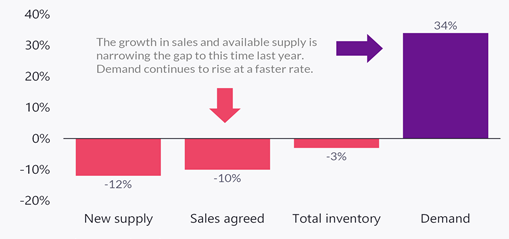Zoopla is hoping pre-existing slower house price growth and tougher mortgage regulations will mean this recession is different to the past.
Analysis by the portal said it does not foresee a major decline in UK house prices as a result of the recession.
It said this was because price growth is already low, mortgage lending criteria has been tightened since the financial crisis and unemployment may be concentrated among younger age bands who rent rather than own a property.
Zoopla’s figures shows properties are selling faster, with the number of days to reach the sold subject to contract phase in the past three months hitting 27 days compared with 39 last year.
Three-bedroom houses remain the fastest selling property on the market, with an average time to sell of 24 days since the lockdown lifted, Zoopla said.
The flow of new supply is running 54% ahead of this time last year, but overall stock per agent remains 3% lower, the portal’s research found.
Zoopla said average UK annual house price growth was 2.5% in July at £253,600.
Richard Donnell, research and insight director of Zoopla, predicted average house prices would end this year up 2% to 3%.
He said: “Housing market conditions remain unseasonably strong despite the UK moving into recession.
“Demand continues to outpace supply and support house price growth of 2.5% per annum.
“Meanwhile, houses are selling faster than flats as we see a shift in buyer priorities in the wake of the lockdown and movers prioritise more space.
“While the economy has contracted sharply and unemployment is rising, consumer spending has rebounded and purchasing manager indices are pointing to a wider rebound in the economy.
“This is positive but the unwinding of the furlough scheme and other Government support is the next challenge that will test the strength of economic recovery.
“In the short term we still believe that house prices will end the year 2% to 3% higher than at the start.”




Nothing like a bit of positive thinking, but it is hard to believe that a huge recession will not have a big impact on ability to buy, activity with the subsequent fall in prices. We are in a bubble at the moment and sure as eggs are eggs, that bubble will burst. Analysts and desk-top predictions are all very well, but those predicting, probably haven’t experienced the effects of past recessions first hand, as many of us have !
ps. I hope they are right.
You must be logged in to like or dislike this comments.
Click to login
Don't have an account? Click here to register
Learn the lessons of history. At the moment we are in an artificially created bubble caused by the stamp duty holiday. This gives us an end date of March 2021 and we have people racing to complete before that date to save themselves thousands. The last situation I can remember having some similarity was in 1989, when Nigel Lawson announced the abolition of double MIRAS on a date in the future. We had a massive influx of buyers into the market causing prices to balloon as demand soared.
What happened the day after that deadline? The market collapsed, as did prices over the following years. I know there are probably very few people like myself still in the property profession who can remember that situation. Clearly there is nobody in Government able to recall the perils of creating an artificial bubble in the property market. But what I see now is a carbon copy of 1989, and unfortunately I can only see one ending next April. Who is going to buy a house then when property prices have climbed to an unsustainable high and they need to pay stamp duty again? And what is therefore the outcome for the market when demand falls off a cliff?
The ironic thing is that those people rushing now to save stamp duty, will most likely see those gains wiped out by their property values collapsing and being worth less than they paid for them. We should also remember that by next April the country is likely to be in a recession, gripped by huge unemployment and Brexit uncertainty, hardly confidence boosting factors to make people want to continue to move house.
Taking all factors into account I think a huge market recorrection after March 2021 is a racing certainty. Problem is everybody is so busy shouting from the rooftops how busy they are, that the long term problem being caused by this stamp duty holiday is being completely overlooked. Fortunately there is still time for the Chancellor to see the error of his ways and take steps to ensure that the ending of the holiday does not turn into the beginning of a crash.
You must be logged in to like or dislike this comments.
Click to login
Don't have an account? Click here to register